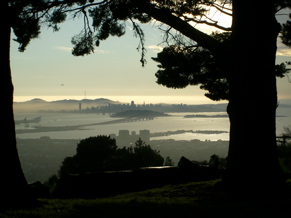In the 2/9 June 1888 issue of Unity, a Unitarian newspaper, reported that Eliza Tupper Wilkes was the pastor of the Sioux Falls Circuit in Dakota Territory (p. 197). C[aroline]. J. Bartlett (later Caroline Bartlett Crane) was pastor of All Souls Church in Sioux Falls. Wilkes had founded the church in Sioux Falls, and Bartlett joined her there in 1887; by 1888, Bartlett had become sole pastor (Standing before us: Unitarian Universalist women and social reform, 1776-1936, by Dorothy May Emerson, June Edwards, Helene Knox, p. 128).
The following biographical notices from History of Minnehaha county, South Dakota, by Dana Reed Bailey (Brown & Saenger, ptrs., 1899, p. 740) tell about Eliza and her husband William. Note that William and Eliza lived apart for three years while Eliza was in California:
Wilkes, William A., was born in Fremont, Ohio, in 1845. He was educated in Marion, Ohio, and at the age of eighteen years removed to Dodge county, Wisconsin. He studied law, and was admitted to the bar in 1871: then practiced law at Rochester, Minnesota, and at Colorado Springs, Colorado, and was elected prosecuting attorney of El Paso county two years. In 1878 he removed to Sioux Falls, where he has since resided. In connection with his professional work he engaged in the real estate business for some years. In 1893, and again in 1897, he was nominated judge of the Circuit Court of the Second Judicial Circuit by the Populist party, but was defeated by Judge J. W. Jones, the Republican nominee. At the general election in 1896 he was elected judge of the County Court of Minnehaha county, and re-elected in 1898. While at the bar he was engaged in some of the leading cases before the state tribunals, has always taken an active part in public affairs, and is a good citizen.
Wilkes, Rev. Eliza Tupper, was born at Houlton, Maine; was fitted for college in New England, and graduated from the State University of Iowa; was educated for foreign mission work; entered the Unitarian ministry in 1868, and took charge of the Universalist church at Neenah, Wis., the same year; in 1869, was married to William A. Wilkes at the last mentioned place; moved from there to Rochester, Minn., where she had charge of a Universalist church; in 1872, removed to Colorado Springs, Col., where they resided six years, and during part of that time she preached in the Unitarian church at that place; came to Sioux Falls in 1878; was one of the foremost workers in the establishment of the Sioux Falls Public Library and the Ladies History Club; started the project of building All Souls church, and labored zealously until the work was accomplished; has been pastor of the Unity church at Luverne, Minn., for the last twelve years, except three years, when she was assistant pastor of the Unitarian church at Oakland, Cal. With such a record of good works, comments would be superfluous.

